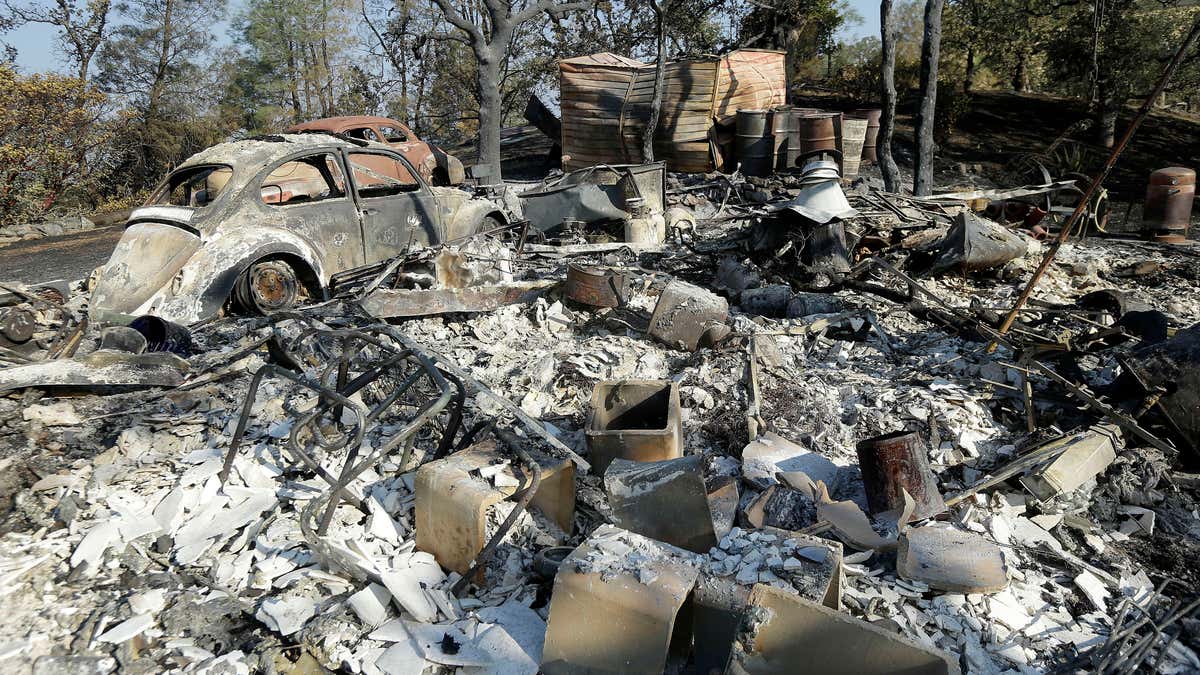
Aug. 6, 2015: The charred remains of a property is shown near Clearlake, Calif. (AP)
Several hundreds of people who were forced to leave their Northern California homes because of a massive wildfire began to trickle back to their neighborhoods on Thursday only to find their houses destroyed.
About 43 homes were destroyed and 13,000 were ordered or warned to evacuate as the blaze swept through nearly 109 square miles of dry brush,
"All of it is gone. It's so surreal," Layna Rivas said through tears just after she discovered her home in Clearlake Oaks had burned to the ground. "It looked like a bomb went off everywhere. It's all black."
Rivas had eight chickens when she left but found only one walking through the rubble.
About 800 evacuees were allowed to return home Thursday, and the number could increase within the next 24 hours as firefighting operations begin to wind down.
"We have crews coming in and out of those tiny roadways," state fire spokeswoman Blanca Mercado said. "It's not just the fire, there's still a lot of things behind the scenes logistically."
Residents were anxious to check on their pets and possessions, but many were stuck camping in cars and trailers, drinking coffee from Styrofoam cups and hoping their houses and hoping their houses weren’t reduced to rubble.
Cassandra Raffaelli and others were staying in the parking lot at a Moose Lodge, a fraternal organization that was serving food to evacuees.
She had been there since Sunday and doesn't know what she will find when she returns home to Spring Valley, a town in a parched rural area 100 miles north of San Francisco.
"To go home, to go to your house, see it (burned) and stuff, that's my major fear," she said.
The flames took out some dwellings and left others untouched near Clear Lake, the largest freshwater lake fully within California. Some houses a mile apart were completely burned, while nearby buildings and trees weren’t touched by the flames.
Chairs, burned books and broken dishes sat in piles of ash, and burned-out cars dotted the landscape. At one home, a metal table and chair sat in the middle of its scorched foundation.
Amid the devastation, crews were gaining ground, getting the blaze close to halfway contained after more than a week of fighting its erratic behavior. It’s the largest of the 23 fires statewide and has the attention of nearly a third of the 10,000 firefighters dispatched to blazes in the drought-stricken state.
California Gov. Jerry Brown visited fire crews and said the state is hotter and drier than it's ever been, making blazes more severe and extending fire season.
"This is the beginning of the fire season, and it's acting like it's the end," Brown said.
Thomas Tompkins, of Spring Valley, which so far hasn't been affected by the fire, has been living in an RV with his wife, Beth, since Saturday. They packed their belongings, grabbed their two dogs and two cats, and got out quickly.
"Hopefully today they'll let us back in," he said. "This is nice, but after a while, I have to go back to work."
At the Moose Lodge, there was a sense of safety. The club has been feeding breakfast, lunch and dinner to about 80 people and was stocked with water, snacks and bedding.
"The overwhelming response from the community would bring a tear to your eye," said Joe Welz, a retiree from Spring Valley who evacuated. "This is humanity at its best."
The Associated Press contributed to this report.

